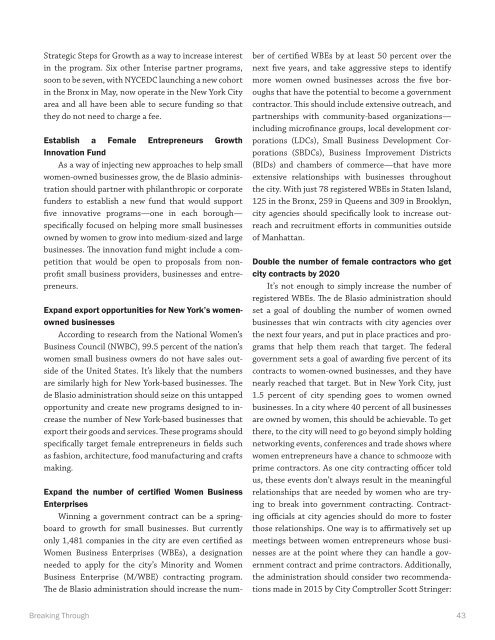BREAKING THROUGH
YWkgl
YWkgl
Create successful ePaper yourself
Turn your PDF publications into a flip-book with our unique Google optimized e-Paper software.
Strategic Steps for Growth as a way to increase interest<br />
in the program. Six other Interise partner programs,<br />
soon to be seven, with NYCEDC launching a new cohort<br />
in the Bronx in May, now operate in the New York City<br />
area and all have been able to secure funding so that<br />
they do not need to charge a fee.<br />
Establish a Female Entrepreneurs Growth<br />
Innovation Fund<br />
As a way of injecting new approaches to help small<br />
women-owned businesses grow, the de Blasio administration<br />
should partner with philanthropic or corporate<br />
funders to establish a new fund that would support<br />
five innovative programs—one in each borough—<br />
specifically focused on helping more small businesses<br />
owned by women to grow into medium-sized and large<br />
businesses. The innovation fund might include a competition<br />
that would be open to proposals from nonprofit<br />
small business providers, businesses and entrepreneurs.<br />
Expand export opportunities for New York’s womenowned<br />
businesses<br />
According to research from the National Women’s<br />
Business Council (NWBC), 99.5 percent of the nation’s<br />
women small business owners do not have sales outside<br />
of the United States. It’s likely that the numbers<br />
are similarly high for New York-based businesses. The<br />
de Blasio administration should seize on this untapped<br />
opportunity and create new programs designed to increase<br />
the number of New York-based businesses that<br />
export their goods and services. These programs should<br />
specifically target female entrepreneurs in fields such<br />
as fashion, architecture, food manufacturing and crafts<br />
making.<br />
Expand the number of certified Women Business<br />
Enterprises<br />
Winning a government contract can be a springboard<br />
to growth for small businesses. But currently<br />
only 1,481 companies in the city are even certified as<br />
Women Business Enterprises (WBEs), a designation<br />
needed to apply for the city’s Minority and Women<br />
Business Enterprise (M/WBE) contracting program.<br />
The de Blasio administration should increase the number<br />
of certified WBEs by at least 50 percent over the<br />
next five years, and take aggressive steps to identify<br />
more women owned businesses across the five boroughs<br />
that have the potential to become a government<br />
contractor. This should include extensive outreach, and<br />
partnerships with community-based organizations—<br />
including microfinance groups, local development corporations<br />
(LDCs), Small Business Development Corporations<br />
(SBDCs), Business Improvement Districts<br />
(BIDs) and chambers of commerce—that have more<br />
extensive relationships with businesses throughout<br />
the city. With just 78 registered WBEs in Staten Island,<br />
125 in the Bronx, 259 in Queens and 309 in Brooklyn,<br />
city agencies should specifically look to increase outreach<br />
and recruitment efforts in communities outside<br />
of Manhattan.<br />
Double the number of female contractors who get<br />
city contracts by 2020<br />
It’s not enough to simply increase the number of<br />
registered WBEs. The de Blasio administration should<br />
set a goal of doubling the number of women owned<br />
businesses that win contracts with city agencies over<br />
the next four years, and put in place practices and programs<br />
that help them reach that target. The federal<br />
government sets a goal of awarding five percent of its<br />
contracts to women-owned businesses, and they have<br />
nearly reached that target. But in New York City, just<br />
1.5 percent of city spending goes to women owned<br />
businesses. In a city where 40 percent of all businesses<br />
are owned by women, this should be achievable. To get<br />
there, to the city will need to go beyond simply holding<br />
networking events, conferences and trade shows where<br />
women entrepreneurs have a chance to schmooze with<br />
prime contractors. As one city contracting officer told<br />
us, these events don’t always result in the meaningful<br />
relationships that are needed by women who are trying<br />
to break into government contracting. Contracting<br />
officials at city agencies should do more to foster<br />
those relationships. One way is to affirmatively set up<br />
meetings between women entrepreneurs whose businesses<br />
are at the point where they can handle a government<br />
contract and prime contractors. Additionally,<br />
the administration should consider two recommendations<br />
made in 2015 by City Comptroller Scott Stringer:<br />
Breaking Through 43


